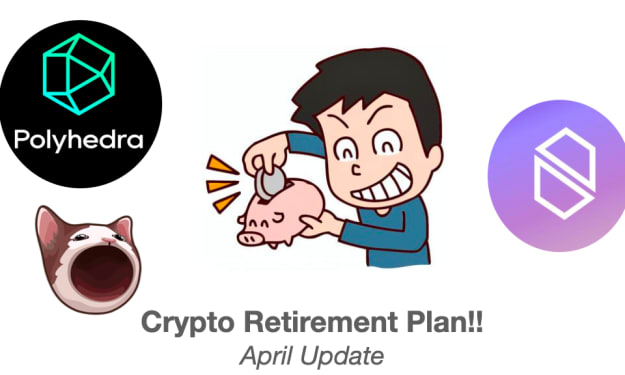How to Buy Crypto Without Knowing the Intricate Details
When I ask family or close friends about crypto, I usually get that “deer in the headlights” look. Cryptocurrency buying can be confusing, but it doesn’t have to be.

My Long-Winded Introduction to Why You Should Buy Crypto Now
Although long-winded, it is crucial.
Many people say they would like to invest in cryptocurrency, but they don’t understand how it works. I don’t understand how the government can keep printing money with no intrinsic value, but they do it. Actually, that is one of the validations, in my opinion, that will make cryptocurrency more valuable.
Take Bitcoin (BTC), for example, there will only ever be 21 million BTCs mined. Therein lies its value. Economics has always been about "supply and demand."
You cannot continue to print money without causing inflation, which is what the US government and many others did while the pandemic raged. There were significantly fewer goods and services produced. I understand why, but I also know the more of anything you have, including fiat currencies, the less valuable they are.
I guess the first thing we should clear up is the difference between fiat currency and cryptocurrency.
Investopedia defines fiat currency as “…a government-issued currency that is not backed by a physical commodity, such as gold or silver, but rather by the government that issued it. The value of fiat money is derived from the relationship between supply and demand and the stability of the issuing government, rather than the worth of a commodity backing it.”
I typically do not use Wikipedia or any …pedias as a reliable reference because anyone can write it or change it, so those are subject to manipulation and false information. Still, I see no reason not to use those for definitions if they’re accurate.
So you see, the only thing really holding the USD afloat is the reputation of the US government, not the politicians; their reputation is shit.
There is no “gold standard” as there was before President Nixon took the USA off it in 1971. Therefore, “supply and demand” and the “stability of the” US economy are what keep the wolves at bay. Well, that and the fact, most other governments have similar problems.
That’s why a lot of countries, particularly China, are resistant to cryptocurrency. They cannot manipulate or “print as much as fiat currency as they want.”
By looking at the recent consumer price index on inflation reported by CNBC on 10 November by Jeff Cox, U.S. consumer prices jump 6.2% in October, the biggest inflation surge in more than 30 years. This will already exceed the 5.9% raise Social Security recipients were promised to start 1 January 2022.
What’s worse, the premium for Medicare, the cost of heating fuel, and other staples required to survive will go up as well.
That’s why we need a hedge against inflation; investing intelligently in cryptocurrency could be that hedge. However, I think you do not need to know the ins and outs to invest. A minimum knowledge base centered around dealing with reputable agencies and dealers is enough to get you started.
Investing $50 to $100 a month in cryptocurrencies like Bitcoin (BTC), Ethereum (ETH), Lite Coin (LTC), or one of the other top ten could help you fight off inflation.
I think that’s probably the longest, long-winded introduction I have ever written, but it was necessary.
Now that we’ve discussed the why let’s take an in-depth look at the how. There are just five easy-to-follow steps to take to become a crypto investor.
First, you’ll need to decide on a reputable dealer. I would warn against joining a group of private investors who claim extravagant gains. There’s just no need to put your investment capital in the hands of anyone but a reputable broker or exchange.
Second, you’ll need to create an account and verify your identity. Many people get frustrated with the steps to verify your identity to buy and sell crypto. However, these steps are necessary to protect your money online. Although there is no fool-proof method to ensure your money is absolutely safe, ID verification is crucial.
Third, make a deposit to buy crypto.
Fourth, place an order.
Finally, decide on where you will keep your crypto. Most keep it with the broker, like Coinbase, KuCoin, e-Toro, Binance, and others. Some brokers like SoFi and Robinhood do not allow you to move your crypto out. But many investors buy their crypto and move it to another wallet or use a flash drive or “USB stick” for storage to keep it safer.
How to Choose a Broker or Crypto Exchange
Not all cryptocurrency exchanges offer all currencies. Hence, you should choose a platform or broker, such as Coinbase, Binance, e-Toro, Kucoin, or others that support the types of cryptocurrencies you are interested in buying. Some platforms charge a nominal fee, but some, such as Robinhood accounts, are free.
Create and Verify Your Account
This is crucial to your security. Once you have chosen a platform, you can create an account by following the instructions found on their website. Once you have created an account, you should verify your identity through your bank account or through other methods such as providing proof of identification, such as an ID.
This is to ensure that you are who you say you are. You should also provide a valid email address as well as a phone number. This step will protect your account and prevent fraud.
It also helps the government to collect taxes on “realized gains” or allow you to claim losses on your investments.
Deposit “Fiat” Cash to Invest in Cryptocurrencies
To invest in cryptocurrency, you must have a minimum amount of cash. This is a requirement when you first start buying Bitcoin or other cryptocurrencies. You can deposit funds by authorizing a wire transfer, debit or credit card, or linking a bank account.
This process can take a few days. Once you’ve made the deposit, you can then begin buying and selling. When you’ve invested enough money, you can withdraw the funds. Many offer a match or bonus for an initial deposit that meets or exceeds their minimum requirement.
You could also set up an affiliate account so that when others sign up with the broker or exchange using your link, you get paid, or you might receive stocks or currency. I know that Robinhood and Webull have an affiliate program, though I have yet to set one up.
Place Your Cryptocurrency Order
This can be done either as a market order or as a limit order. According to NerdWallet, a market order executes your trade at a price offered by other traders or the “market,” while with a limit order, you can decide what price you want to pay, but you will have to wait for someone who wants to sell or buy at that price.
Investopedia defines “market capitalization” as:
...the total dollar market value of a company’s outstanding shares of stock. Commonly referred to as “market cap,” it is calculated by multiplying the total number of a company’s outstanding shares by the current market price of one share.
Although they use stocks, it is the same with cryptocurrency. Like Bitcoin, there will only be 21 million coins, with the price at $57,000; their market cap is currently $1,170,000,000,000 (1 DEC '21).
You can measure almost any coin or token by its market cap, though some do not have a set number of coins before they stop production. Others will burn or destroy coins to try to pump up the price.
According to Forbes, the leading five peer-to-peer currencies are:
1. Bitcoin (BTC) has a market capitalization of about $1.17 trillion.
2. Ethereum (ETH) has a market capitalization of around $520 billion.
3. Binance Coin (BNB) has a market capitalization of about $88 billion.
4. Tether (USDT) has a market capitalization of more than $70 billion.
5. Cardano (ADA) has a market capitalization of around $66 billion.
I would stay away from Cardano (ADA) for a while anyway until things smooth out. E-Toro recently announced they would delist Cardano and Tron for US customers.
This was a total shock to many in the crypto investing world. I own both and will wait until things iron out before deciding what to do. Especially considering a major European exchange decided to list Cardano the same day.
Plus, Charles Hoskinson, the Cardano founder and co-founder of Ethereum, says he was “blindsided” by the e-Toro announcement on Business Insider.
There’s currently nothing we’ve received, no regulatory event, no subpoena, nothing from any regulatory agency, no threats of lawsuits, none of these things, that’s why we’re so blindsided by it because actually, the trend has been over the last six months a significant increase of liquidity on Cardano. — Charles Hoskinson.
During the previous six months, ADA went from $1.50 to $2.96 but dropped back to around $1.50 after the announcement.
If you want “safe,” buy BTC or ETH. Yes, the price will still go up and down, but if you do not invest the money you might need for an emergency, you won’t have to sell at a loss. Although BTC has a current market cap capitalization of around $1.17 trillion, since there will never be more than 21 million produced, supply and demand should continue to drive the price.
If you want to make a lot of money and don’t mind the risk, there are many coins and tokens that should see incredible gains in the next two to five years with the growth of the Metaverse and Web 3.0.
Take a look at Avalanche, Sand, Mana, RLY, and Axie Infinity. Don’t just take my word for it and buy, do a little research. Two others to consider I wrote about last week, What Is the Difference Between Kadena (KDA) & Flux.
What Is the Difference Between Kadena (KDA) & Flux
Lately, you’ve probably heard chatter about Kadena or Flux, adding one or both of these to your portfolio could add tremendous upside potential.

Select a Storage Method
Crypto wallets store cryptocurrency, unlike a regular wallet, which stores actual objects such as cash, credit cards, and other valuables. If you’re not familiar with the difference between a hot and cold wallet. Here’s a quick primer. A hot wallet is a storage option where your private keys and other sensitive data are kept in a hot location, like a bank vault.
A “cold” wallet, by contrast, is an offline storage option where your cryptocurrency is physically stored. A cold or physical wallet can range from a simple hardware wallet such as a Ledger Nano X, available from Amazon and can handle up to 1250 different cryptocurrencies. (I use and recommend this wallet).
However, there are other less expensive options, such as CoolWallet Pro and Trezor Model One. Although using both is possible, a combination of the two is always a safer solution.
Final Thoughts
While the cryptocurrency market is still in its infancy, the process of buying and selling is rapidly becoming more regulated. All you need to do is choose a reputable Broker or Crypto Exchange, create an account, and verify and validate it. Then, deposit cash to invest on the platform, place your order and finally select your preferred storage method.
Keep in mind; the chance of profit or loss depends primarily on supply and demand, much like any other product or commodity. Likewise, dealing with private parties to buy or sell your crypto increases your chance of getting scammed.
Even some large brokers and agencies have gotten “hacked,” check to see how the broker you decide on handled past incidents before you trust them with your money.
It’s almost inevitable that an exchange will get hacked; how they handle it is what you should focus on, not the hack. Unlike your local bank, there is no Federal Deposit Insurance Corporation (FDIC) to refund your losses if the exchange gets hacked.
You can read about some of those more significant hacks in the article, A Comprehensive List of Cryptocurrency Exchange Hacks by SelfKey.org.
Do the research and protect your investment. I use three brokers, Binance, e-Toro, Webull, two online wallets, and a cold wallet. It’s like the adage goes, “Don’t put all your eggs in one basket.”
My friend, Tom Handy, recently did an article, How to Get Started in Cryptocurrency Today, discussing many of the same topics, so if you want more detail or a better understanding, read his too.
DISCLAIMER: This article is for entertainment and informational purposes only. It should not be considered financial or legal advice. Not all information will be accurate. I am not a financial adviser, and anything I propose should be considered friendly banter to show you what is possible if you invest your money in these vehicles. However, there are no guarantees. Consult a financial professional before making any significant financial decisions.
#Cryptocurrency #ETH #Bitcoin #CryptoInvesting

Stephen Dalton is a retired US Army First Sergeant with a degree in journalism from the University of Maryland and a Certified US English Chicago Manual of Style Editor. Also, a Top Writer in Finance, Nutrition, Travel, Fiction, Transportation, VR, NFL, Design, Creativity, and Short Story.
Website | Facebook | Twitter | Instagram | Reddit | Ko-fi | NewsBreak | Medium






Comments
There are no comments for this story
Be the first to respond and start the conversation.